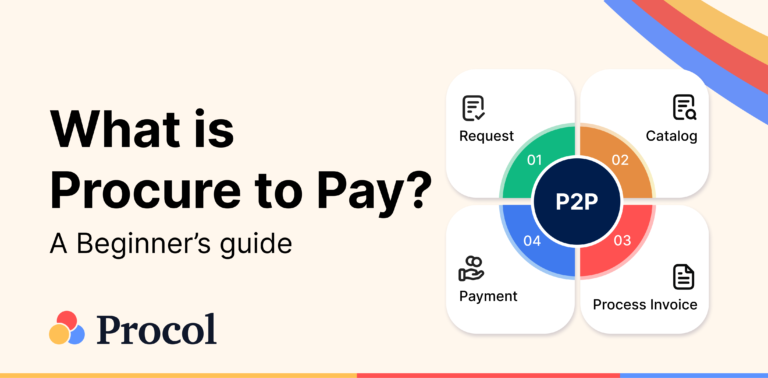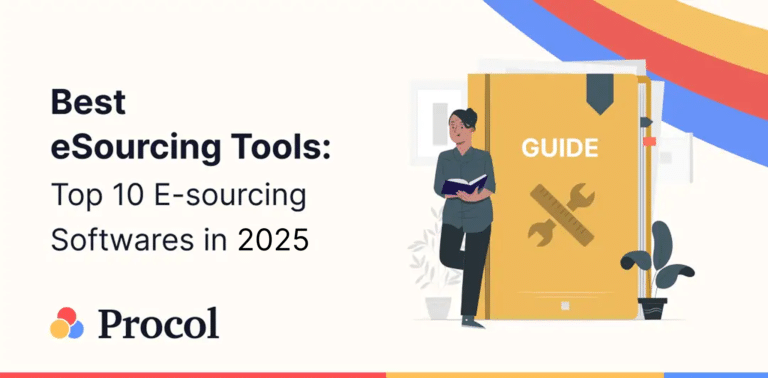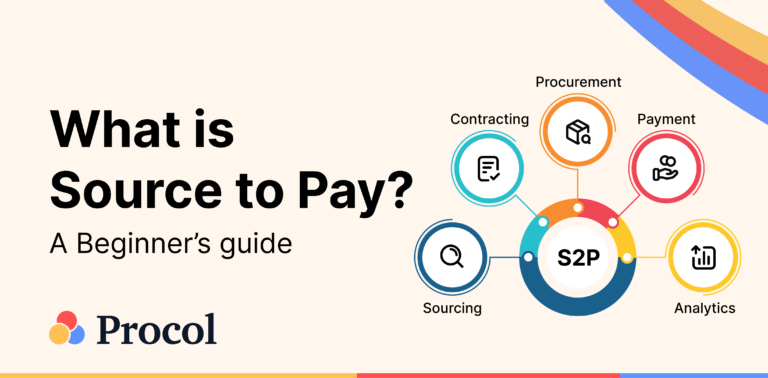Procol • April 15, 2025
Best Contract Management Software in 2025: A Buyer’s Guide

In today’s fast-paced business world, good contract management has become essential for companies big and small. Contract management software has become a game-changer, revolutionizing how businesses deal with legal agreements. This reliable tool streamlines the entire contract lifecycle, from drafting and negotiating to signing and renewing, helping companies save time, lower risks, and get more done overall.
As businesses handle increasing contracts, they have a growing need for dependable systems to manage these agreements. The contract management platform empowers companies, providing a central hub to keep documents, streamline workflows, and gain valuable insights through data analysis. The best contract management software can help organizations better monitor their commitments, hit due dates, and follow regulations – whether dealing with supplier contracts or internal deals.
What is contract management software?
Contract management software is a digital solution that helps organizations create, store, manage, and track contracts all over their lifecycle. Contract management software helps automate contract workflows, thus making sure of compliance, reducing risks, and improving skills. These contract management systems act as a central contract store software, allowing users to easily search, recover, and manage agreements. The best contract management software includes features like automated alerts, electronic signatures, and AI-powered contract analysis.
For businesses dealing with suppliers, vendor and contract management software make sure better oversight of vendor agreements, performance, and obligations. A well designed contract management platform also merges with other business tools for smooth contract automation and risk management.
Some main things they can do include:
- Document storage and organization
- Change tracking and version control
- Search capabilities for specific criteria
- Critical date alerts and notifications
- Reporting tools for contract analysis
Advanced contract management software may also include:
- New contract request management
- Review and approval of workflow automation
- Digital signature collection
- Project portfolio management integration
- Spend analysis tools
- Key Performance Indicator (KPI) monitoring
Who uses contract management software?
Contract management software is crucial for businesses of all sizes. It helps companies streamline processes and boost efficiency.
Small businesses and startups use these contract management tools to enhance their capabilities without a big legal budget. The contract repository software provides a central place for all contracts, replacing manual storage methods.
While large organizations were the primary users, businesses of all sizes can now access this technology. These systems offer benefits to various departments, including:
- Legal teams: Automated approval workflows ensure contract terms meet legal requirements without constant oversight.
- Sales departments: Faster contract creation and execution lead to quicker revenue generation.
- Procurement teams: Better tracking of vendor performance and contractual obligations.
- Compliance officers: Easy demonstration of regulatory compliance through digital audit trails.
- Finance departments: Improved visibility into actual revenue and outgoings based on contract conditions.
5 Ways Contract Management Software Can Help Your Business
Contract management software has lots of upsides for companies. It makes things run and boosts productivity. Here are five significant ways it can lend a hand:
- Contract management software influences the entire contract lifecycle, from creation to renewal. It speeds up the review process through customizable automated workflows, boosting productivity. This contract automation software covers tasks like creating user accounts, sending welcome packets, and turning on benefits for new customers.
- The contract repository software keeps exact contract histories and full audit trails, ensuring companies are in control and follow the rules. It also spots possible risk areas in contracts, warning key staff about issues that need attention. This forward-thinking way to manage risk can shield organizations from legal and financial troubles.
- Contract management software boosts renewal awareness by filing away old contracts and using customizable alerts. These features ensure that renewal chances, often overlooked even though they’re easy wins, stay caught up. You can set up alarms with default or custom settings, and they keep going until the team member in charge reaches the next milestone.
- The contracts management system has analytics tools that quickly access crucial contract numbers. This helps companies measure and track the business value they get from their contracts and risk levels. These findings allow for data-based choices, such as finding new opportunities and ways to cut costs.
When is the right time to invest in a contract management solution?
Knowing when to invest in procurement contract management systems is critical for businesses aiming to improve processes and cut risks. Several signs indicate it’s time:
- Rapid growth increases contracts and risks, making effective management crucial.
- Missing key renewals can cause financial losses and damage to relationships. Contract repository software can prevent this by automating notifications.
- If legal teams spend over 25% of their time on admin tasks, it’s time to automate, allowing focus on high-value work.
- Companies seeking funding should consider implementation, as investors often require clear contract summaries.
- New legislation affecting the company or suppliers may necessitate robust contract management systems to maintain compliance and minimize risks.
- Recognizing these signs helps companies make timely decisions to invest in the best contract management software, boosting efficiency and risk management.
What are the benefits of contract management software?
Contract management software has a positive influence on businesses of all sizes. These digital systems make processes more accessible, increase output, and offer valuable insights. Let’s look at some key benefits:
- Centralized Document Storage: The contract management platform greatly influences how companies store contract-related documents. This eliminates the need for physical storage and simplifies keeping all contracts and related papers in one spot. It also allows users to find and search for documents, which boosts productivity and makes work more effective.
- Improved Teamwork: These systems let authorized users work on contracts simultaneously. They can see the same information, which cuts down on mix-ups about agreed-upon terms. This teamwork spreads to different departments involved in the contract’s life cycle, such as account management and finance.
- Time-Saving Automation: Contract management software impacts many manual processes. It sets up user accounts, sends welcome packets, and starts benefits for new customers. It also simplifies communication with contract parties, which speeds up contract administration. Users save about three hours of admin time for each contract.
- Better Compliance and Risk Management: These systems maintain accurate contract histories and full audit trails, which helps companies follow the rules. They also help identify potential contract risks and notify key staff about issues that need attention.
- Better Contract Visibility: Storing all files in one central online location gives businesses a clearer picture of their contracts. Companies can monitor different stages of a contract’s life, ensuring nothing slips through the cracks or gets forgotten.
- Lower Costs: An effective contract system cuts expenses throughout the organization. It ensures that the appropriate number of individuals review each contract before its release, reducing unnecessary holdups, errors, and potential penalties for non-compliance.
- Better Decisions: Contract repository software enables companies to make more informed choices by providing easy access to crucial business data. It displays actual revenue and expenditures based on contract conditions such as test periods or early termination clauses.
16 Best contract management software
Contract management software is necessary for companies to simplify their contract processes and boost productivity. Check out these best contract management tools on the market:
Procol:
Procol is the best contract management software with a central repository for all contract documents. It offers a user-friendly interface, customizable workflows, and robust search capabilities. The contract repository software provides advanced analytics, reporting tools, and seamless collaboration features. It integrates with CRM and ERP systems and prioritizes security with encryption and access controls.
Procol streamlines contract creation with templating tools and e-signature capabilities. It includes version control, document comparison, and a clause library for consistency. The contract management platform generates custom reports and offers mobile accessibility. It’s scalable for various business sizes and industries. With dedicated support and training, Procol provides an efficient solution for managing contracts from creation to execution.
Ironclad:
The contract management platform features cutting-edge tech and an easy-to-use interface. It offers automated workflows and lets teams work together in real time.
DocuSign CLM:
Users can set up custom workflows, see everything in one place on a dashboard, and get insights from AI-powered contract analysis. It has features that help smooth out the contract lifecycle, like reminders when it’s time to renew, approval steps, and more.
Icertis:
Icertis is a CLM platform that manages contracts after they’re signed. It also seamlessly integrates with ERP and spend management systems. This tool uses AI to create contracts, manage them, and include features to ensure compliance with rules.
SirionLabs:
It comes with AI-powered analytics intelligent workflows and ensures compliance processes run independently.
SAP Ariba Contracts:
This one focuses on managing contracts for buying and selling, with contract automation software built in.
Conga Contracts:
Conga Contracts offers a complete solution for managing contracts from start to finish. It streamlines complex contract tasks across different locations and teams. This tool boosts contract visibility and ensures everyone follows contract rules, which helps reduce risks. It handles the contract lifecycle, streamlines processes, and uses AI to extract essential data.
Salesforce Revenue Cloud:
Combines Salesforce CPQ, Billing, and Subscription Management to handle contracts from start to finish.
LinkSquares:
A top choice among contract management tools, LinkSquares uses AI to manage contracts. It gives users a complete view of their contracts, showing where and when they’ll be done and the back-and-forth during talks. This tool impacts how teams handle their paperwork. It uses AI to analyze contracts and makes review and execution processes automatic.
Oneflow:
Oneflow is a contract management software that uses AI to automate the contract process. It handles everything from before to after signing, bringing all teams together in one spot with contract management tools like intelligent archives, calendars, and links to CRM systems.
PandaDoc:
It is a comprehensive solution for quickly and simply creating, changing, delivering, monitoring, and signing Contracts and other business papers. It provides approval workflows, ways to renew contracts, and contract management tools to analyze document data.
Evisort:
Offers contract analysis powered by AI and connects with many business contracts management system tools.
Contract Logix:
Contract Logix offers a contract lifecycle management solution that uses data to streamline and automate contract drafting, negotiating, approval, execution, and management. It keeps contracts safe in one place and has libraries of clauses you can change.
Cobblestone Contract Insight:
CobbleStone Contract Insight Enterprise is the top contract lifecycle management (CLM) software for major organizations worldwide. Stores contract online and have contract management tools to track money matters.
Agiloft Contract Management Suite:
Offers countless templates for clauses and automated workflows.
Jaggaer:
Stands out for steady product updates and a wide range of features.
Contract management software features
Contract management software streamlines the contract lifecycle with key features:
Advanced AI Contract Management:
AI in contract management systems can smooth processes, cut down on time, and lower risks. It identifies issues, offers alternatives, and automates contract generation.
A Self-Service Portal That’s Easy to Use:
Contract management software should empower workers across the company to handle contract tasks independently. This boosts productivity without burdening legal teams.
Creating Documents Automatically:
Features that combine documents automatically can quickly produce formatted contracts. This relieves legal teams of work while ensuring accuracy and consistency.
Contract Obligation Management:
Contract automation software enables users to extract and monitor business terms easily. This helps track whether people follow the rules and improves relationships with vendors and customers.
Seamless Integration with Corporate Systems:
Contract management systems that link to other business tools, like Microsoft Dynamics, can speed up processes and give easy data access across departments.
Efficient Workflow Automation:
Features that automate workflows can ensure quality work is done on time, freeing people to focus on big-picture tasks.
Safe Central Repository:
Platforms that keep everything in one place with strong security can protect important contract info, making it easy to find, manage, and track while following the rules.
Integration with E-Signature Tools:
Connecting to top e-signature platforms can make signing contracts smoother, eliminating manual steps and boosting compliance and security.
Mobile Accessibility:
Cloud-based contract management systems should give users access to contract data anytime and anywhere. This allows users to be flexible and receive updates in real-time on different devices.
Analytics and Custom Reporting:
The best contract management software should allow users to create analytics and reports. This gives insights into performance, risk, and compliance tailored to specific business roles.
Future of Contract Management Software
Contract management software is evolving to boost business efficiency and reduce risks. Key trends include:
Embracing Emerging Technologies
- AI and Automation: AI will automate tasks and provide insights.
- Blockchain: Smart contracts will enable secure, transparent management.
- Collaborative Platforms: Cloud-based tools will improve coordination.
Enhanced Functionality
- Integrated Workflows: Integration with other systems will streamline processes.
- Intelligent Analytics: Advanced analytics will guide decision-making.
- Mobile Accessibility: On-the-go access will increase flexibility.
Improved User Experience
- Intuitive Interfaces: User-friendly designs will simplify contract management.
- Customizable Workflows: Automated processes will adapt to unique needs.
These trends will help businesses improve contract management, boosting efficiency and innovation.
Conclusion
Contract management software streamlines how businesses handle legal agreements. It centralizes documents, automates workflows, and provides analytics, reshaping contract lifecycle management. As companies deal with more contracts, these systems are crucial for tracking obligations and ensuring compliance.
The future of contract management systems is promising, with AI and machine learning advancements set to enhance its capabilities. Improved data extraction, risk assessment, and predictive analytics will give businesses more insights. As technology evolves, these contract management tools will become essential for organizations to navigate complex business relationships efficiently.
Frequently asked questions
What does contract management software do?
Contract management software smoothens the creation, implementation, and tracking of contracts all over their lifecycle. It helps businesses automatize contract workflows and improve compliance and collaboration. These contract management systems serve as central storage, enabling safe storage and quick recovery of agreements. The best contract management software also merges with other business tools for smooth operations. Also, vendor contract management software ensures better supplier relationships by overseeing contract duties and performance.
How much does contract management software cost?
The cost of contract management software varies depending on features, deployment type, and business size. Basic contract management tools start at around $20–$50 per user per month, while advanced contract automated software with AI-powered analytics, merger, and compliance features can cost several hundred dollars monthly. Enterprise-level contract management systems may require custom pricing based on usage, storage, and support needs.
What to look for in contract management software?
When seeing contract management software, think of main factors like ease of use, automation capabilities, security and scalability. An effective contract management platform should include safe contract storage, automated alarms, electronic signatures, and compliance tracking. If managing vendor agreements and vendor contract management software should offer supplier performance overseeing and risk measurement. Merging with existing tools and AI-powered contract analysis are also important features.
How to choose contract management software?
To select the best contract management software, understand your business needs and measure your contract size. Compare different contract management systems based on usage, user-friendliness, and changeable options. Look for contract management tools that offer contract automation software features to lessen the manual effort. A secure and well-organized contract storage software is important for easy access and compliance tracking. Consider vendor contract management software if you work with multiple suppliers. Finally, choose a contract management system that lines up with your budget and offers good customer support.
Explore more from Procol
Discover expert tips, how-to guides, industry insights, and the latest procurement trends.

What is Procure-to-pay (P2P)? An Ultimate Guide
Procure to pay is the process from procurement of materials needed...

Best eSourcing Tools: Top 10 eSourcing Software in 2025
Discover top 10 e-sourcing tools and esourcing platforms necessary for efficient...

What is Source-to-pay in 2025? An Ultimate Guide
Source to pay is the process of sourcing vendors to procure...



















